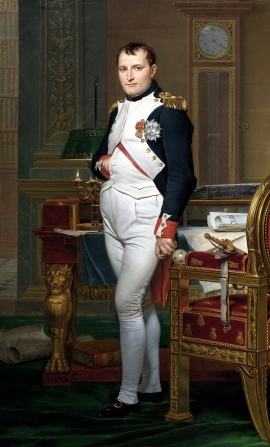It was right about now, in 1804, that Napoleon changed life not only for the French, but for most of the rest of Europe as well.

1812 portrait by Jacques-Louis David - click for the large version with the word 'Code' visible on the papers on the desk.
That was when the new Civil Code he had ordered was officially adopted and thousands of people who had never known the rule of law woke up to find that feudalism had vanished overnight.
Until the Code Civil des Francais, the closest things to law were really just customs, plus all the charters, exemptions and special privileges granted by kings and local lords. It was all pretty hit or miss and could vary from region to region.
What Napoleon demanded and got was a legal structure based on Roman law as embodied in the Justinian Code of the 6th century. But it differed dramatically in many respects, most notably when it came to religion – Justinian, the Eastern Roman Emperor, ordered that everyone had to be a Christian. Heresy was out and while being a pagan wasn’t against the law, certain pagan practices were.
Napoleon’s Code, on the other hand, in the spirit of the revolution, called for freedom of religion, an end to privileges granted simply by birth and a civil service that was based on merit.
On the criminal side, it set up a Court of Assizes to try felonies and for the first time ever, it mandated legal representation for the accused – more than 30 years before the English got around to allowing accused felons to have a lawyer.
And because we’re talking Napoleon here, the code went into effect in much of the territory he occupied – thus, it became the basis of law in Italy, Spain, Portugal, Belgium and the Netherlands. It was translated into Arabic and became part of the law in Egypt after the Khedive, and in 1864 it was adopted by Romania, which uses it still.
There have been numerous changes and additions over the years of course, but it remains the core of current French law. With amendments, it runs to about 3,000 pages and is available on CD from Dalloz or you can read it online here.
It’s clear from the portrait shown that the painter David thought that Bonaparte’s chief claim to fame was not military but civil.
***
OMG – nearly forgot Bach’s birthday – he was born in 1685. Listen to this while you do the math:


